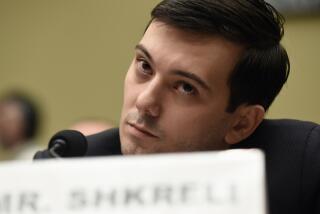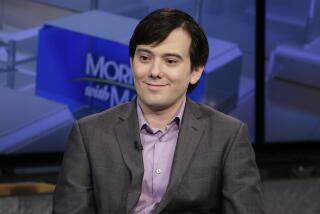Judge tells Martin Shkreli to keep his mouth shut

Martin Shkreli has blatantly defied his attorneys’ advice to lay low. (July 5, 2017) (Sign up for our free video newsletter here http://bit.ly/2n6VKPR)
- Share via
Martin Shkreli, the boisterous former hedge-fund manager and pharmaceutical-industry executive, was chastised Wednesday by a judge for speaking to the media during the early days of his securities-fraud trial.
“All your client has to do is stop talking in the courthouse and around the perimeter of the courthouse,” a visibly frustrated U.S. District Judge Kiyo Matsumoto said.
Shkreli has struggled to abide by his defense attorneys’ advice to keep quiet since being charged in late 2015 with misleading investors in two of his hedge funds and the biopharmaceutical company Retrophin, all of which he founded. He has live-streamed his thoughts via YouTube and was kicked off Twitter this year for harassing a journalist.
But for prosecutors and Matsumoto, the breaking point appears to have been a surprise visit Shkreli, 34, made last week to an overflow room in the courthouse filled with reporters. During the visit, Shkreli criticized the prosecution team from the Eastern District of New York in Brooklyn, mocking them as the “junior varsity” to the federal prosecutors in Manhattan.
“I think the world blames me for almost everything,” he said before his attorney called him out of the room.
Shkreli’s attorney, Benjamin Brafman, said he was alerted by a U.S. marshal that Shkreli was in the room and “ran” across the courthouse to pull him out.
“I was shocked by these comments and statements. ... Any juror could have heard them,” Matsumoto said.
Prosecutors asked that either Shkreli be ordered to keep quiet or the jury be semi-sequestered so they could not hear chatter in the hallways about the trial or comments made by Shkreli.
“Mr. Shkreli’s behavior appears to be escalating,” said Jacquelyn Kasulis, chief of the business and securities fraud section for the Eastern District U.S. attorney’s office. “It is of paramount importance that we avoid a circus-like atmosphere.”
Shkreli’s comments could taint the jury, especially if they were to overhear reporters discussing the case in the hallways or as they entered or left the courthouse, Kasulis said. “We are very, very concerned that we will find ourselves in a position that we can not unring the bell,” she said.
Kasulis pointed to comments Shkreli made to reporters last week indicating that he had never considered a plea deal to resolve his case. In fact, she said, Shkreli’s defense team initiated plea negotiations several times. “Many of Mr. Shkreli’s statements are inaccurate,” Kasulis said.
Brafman said he was “outraged and dismayed “ by Kasulis’ statements regarding plea negotiations. Brafman said he was ethically bound to raise the issue of a plea deal with prosecutors but that Shkreli repeatedly refused to consider it. “He said, ‘I would never plead guilty to something I didn’t do. We’re going to trial,’” Brafman said.
Brafman also rejected the need for a gag order and said that his client was being “baited,” particularly by a reporter who peppers him with questions when he leaves the courtroom. Maneuvering the 100 yards between the courthouse steps and the car sometimes requires Shkreli to deal with a scrum of 40 to 50 members of the press, a stressful situation for someone with anxiety such as Shkreli, Brafman said.
Matsumoto ordered Shkreli to no longer speak to reporters about the case either in the courtroom or on the street outside. “This isn’t going to help Mr. Shkreli in the end. He is risking exposure in the media” that could harm him, Matsumoto said.
More to Read
Sign up for Essential California
The most important California stories and recommendations in your inbox every morning.
You may occasionally receive promotional content from the Los Angeles Times.













